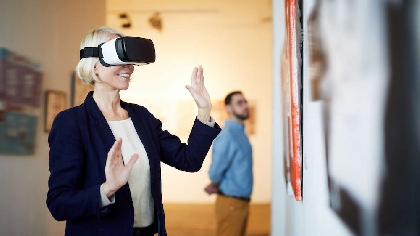
Games played using virtual reality headsets are effective in helping children who have cochlear implants to pinpoint where sounds are coming from
I'm Paul Hutton with news that scientists are using computer games and virtual reality headsets to help profoundly deaf children overcome their disability. The games help the child understand speech and locate sounds. Games played using virtual reality headsets are effective in helping children who have cochlear implants to pinpoint where sounds are coming from. Unlike hearing aids, which simply amplify sounds, cochlear implants turn air vibrations into electrical signals that are sent to the brain where they are experienced as sound.


 Archbishop calls for society wide shift in support for unpaid carers
Archbishop calls for society wide shift in support for unpaid carers
 Adult social care workers urged to share Covid stories
Adult social care workers urged to share Covid stories
 Young Carers missing out on carer's allowance
Young Carers missing out on carer's allowance
 20% increase in those at risk from type 2 diabetes
20% increase in those at risk from type 2 diabetes
 Black and ethnic minority people are underrepresented in virtual patient cohorts.
Black and ethnic minority people are underrepresented in virtual patient cohorts.
 NHS dental treatment has still not returned to pre-pandemic levels
NHS dental treatment has still not returned to pre-pandemic levels
 London councils object to relocation of specialist cancer service
London councils object to relocation of specialist cancer service
 West Lothian Council workers could trigger a summer of strike action
West Lothian Council workers could trigger a summer of strike action
 Care UK in Portsmouth to remember the hundreds of thousands of those who took part in D-Day
Care UK in Portsmouth to remember the hundreds of thousands of those who took part in D-Day
 NHS and social care leaders could save £1 billion annually by adopting an AI-led home healthcare model
NHS and social care leaders could save £1 billion annually by adopting an AI-led home healthcare model
 Software to reduce hospital waiting times will be rolled out across Scotland over the next year
Software to reduce hospital waiting times will be rolled out across Scotland over the next year
 No money for carers to get free public transport in Suffolk
No money for carers to get free public transport in Suffolk
 Carer's Allowance overpayments affecting five thousand people in Northern Ireland
Carer's Allowance overpayments affecting five thousand people in Northern Ireland
 Information about insect bites and stings surges ahead of this bank holiday weekend
Information about insect bites and stings surges ahead of this bank holiday weekend
 Skinny jabs like Ozempic are being used as a cop-out
Skinny jabs like Ozempic are being used as a cop-out